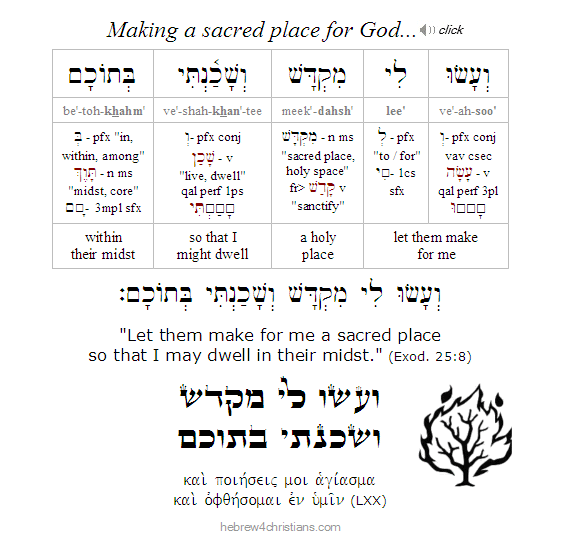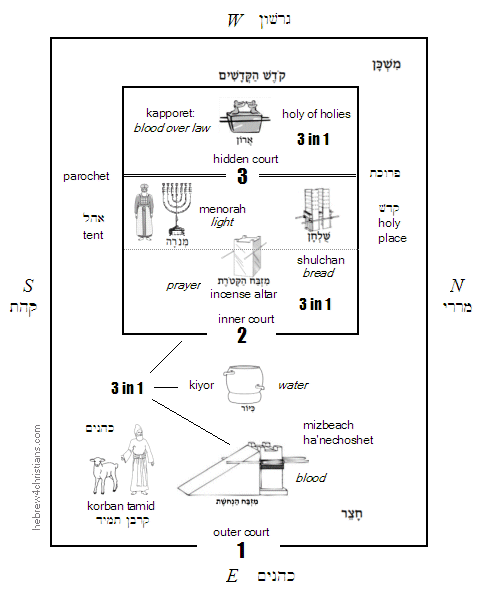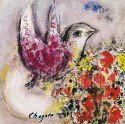|
In this week's Torah portion (Terumah), God asked the people to offer "gifts from the heart" to create a "place" for Him: "Let them make for me a sanctuary that I may dwell in their midst" (Exod. 25:8). The Hebrew word for "sanctuary" is mikdash (מקְדָּשׁ), which comes from the root word kadash (קָדַשׁ), "to be set apart as sacred." A mikdash is therefore a "set apart space," or a "holy place" that represents something treasured - a place of beauty and worship, a refuge, a place of rest. Other words that share this root include kedushah (holiness), kiddushin (betrothal), kaddish (sanctification), kiddush (marking sacred time), and so on. When God said, "Let them make for me a mikdash," then, he was inviting the people to make a sacred place within their hearts for His Presence to be manifest.... The "material" required to make this place was ultimately the heart, expressed in free-will offerings given to God.
The purpose of mikdash, this "set apart space," was for God to "dwell" in their midst. Note that the word "dwell" comes from a root (שָׁכַן) meaning to "lodge together" or to "lie down with someone," and therefore the Tabernacle was called the mishkan (מִשְׁכָּן), a "set apart place" intended for rest and intimacy. Inviting God's Presence within our hearts gives us communion and fellowship with Him. The sages note that the phrase, "that I may dwell in their midst" could be translated as "that I may dwell within them," suggesting that the point of the Tabernacle was to bring God within the hearts of His people... We must create a place within our hearts, in other words, for God to dwell within us... Yeshua likewise told us that we would experience peace and joy when we would "abide in Him." Note that the gematria of the word mishkan (מִשְׁכָּן) is 401, which is the same as the word shema (שְׁמַע), "hear!" or "listen" (Deut. 6:4). When we really stop to listen to the LORD, we will find His glorious and loving Presence...
 |
Some of the sages have said that the physical Tabernacle (and later, the Temple) was given as a concession to the frailty of man. After all, when the people had the opportunity to encounter God without a mediator at Sinai, they shrank back in terror. The Tabernacle, then, presented a form of "mediation" that provided symbols to help bring "heaven down to earth." The physical presence of the Tabernacle attempted to convey a sense of the immanence of God in the world. "Holy holy holy is the LORD God of hosts; the whole world is filled with His glory" (Isa. 6:3). The Scriptures plainly teach, however, that there is literally no "place" where God can physically dwell. When King Solomon dedicated the Bet Ha-Mikdash, the Temple in Jerusalem, he rhetorically prayed: "Will God indeed dwell on the earth? Behold, heaven and the highest heaven cannot contain you; how much less this house that I have built! (1 Kings 8:27). Likewise the prophet Jeremiah reports the word of the LORD: "Do I not fill heaven and earth?" (Jer. 23:24) Understood in light of this truth, it is clear that the Tabernacle was meant to symbolize a deeper, spiritual reality of the heart. As Yeshua said, "The Kingdom of God is within you (Luke 17:21).
The deepest message of the Mishkan, however, has to do with sacrificial love. The entire reason for the sacrificial system was to draw us close to God. The sacrifice of an innocent animal for the sake of a sinner provided tangible hope that a holy and perfectly righteous God made a way for love and acceptance to prevail. Indeed the idea of "sacrifice" is korban (קרְבָּן), a word that means to draw near (karov) to God. The various sacrificial rituals were "examples" (ὑπόδειγματα) and "shadows" (σκιάς) of the heavenly reality that was given in the sacrifice of Yeshua, the Lamb of God (Heb. 8:5; 10:1). Because of Yeshua, God draws near to us so that we can draw near to Him.... He is the ultimate "Korban" that brings us into eternal fellowship with God. Yeshua is the Father's "gift of the heart" given for you. The love of God put the blood of his son the cross, just as the love of God provided the altar at the Tabernacle. Both in the sacrificial rites of the brazen altar and in their later fulfillment in the crucifixion of Yeshua, the heart needs to trust in God's personal love. Yeshua stands at the door and knocks, ready to eat a "covenant ratification meal" with all who are trust in Him (Rev. 3:20).
May you find courage to open your heart to Him now...
 |
|




